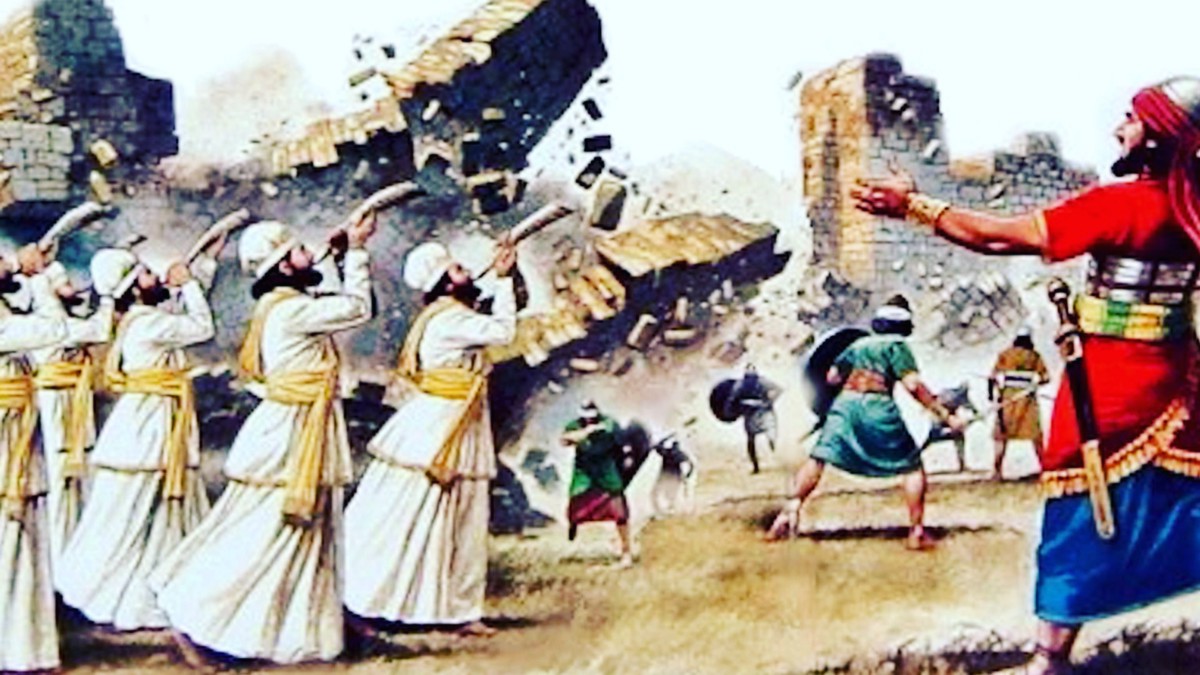To accompany your Come Follow Me study for May 23-29.
In addition to reading these chapters from Joshua, you may enjoy::
- The video Come Follow Me 2022 (May 23-29) Joshua | Be Strong. Be Courageous at https://www.youtube.com/watch?v=G7OWnKtHJSE
- The corresponding commentary in the Institute Student Manual in the online Gospel Library.
- The remaining chapters from the book of Joshua, especially chapter 10, which tells the remarkable story of the sun standing still.
If you would like a Kahoot game related to this material which you could use for your own review or to use with your family or class, click here: https://create.kahoot.it/share/joshua-1-8-23-24/d41c729f-6a99-4570-b7ab-9f7aea2c0ac2
Points to Ponder in Joshua 1-8, 23-24
1. How was Joshua’s relationship to Moses much like Brigham Young’s relationship to Joseph Smith?
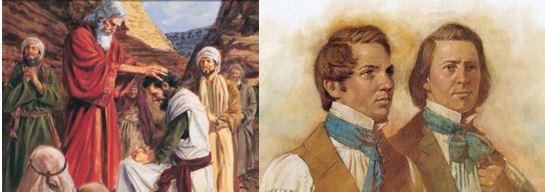
2. What passage in Joshua would you guess was once recited at the opening exercises of each Latter-day Saint youth activity night?
3. Why, of all people, was the prostitute Rahab singled out (with her family) to be spared the fate which befell the rest of Jericho? And how can you defend her lying?

4. Why would the Lord have dammed up the Jordan River for the Israelites at flood stage, in addition to making it easier for the Israelites to get across without drowning? What does He do for us that accomplishes the same thing?

5. Just when did the Lord stop sending manna to the Israelites? What lessons can we generalize from the answer?
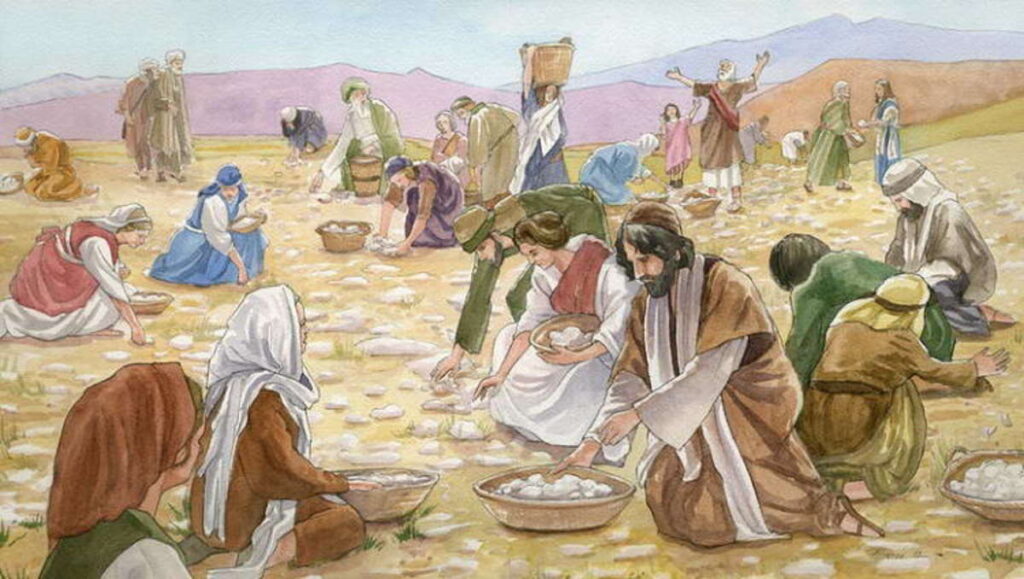
6. What passage in this week’s reading best shows the truthfulness of Ether 12:6, that we receive no witness until after the trial of our faith?
7. What passage in this week’s reading may have been the inspiration for one of the verses in the hymn “How Firm a Foundation”?
8. What do you consider the two most significant pieces of counsel in Joshua 1:8 concerning what we should do with the scriptures? What can we conclude about the those who read the scriptures constantly but are still poor?
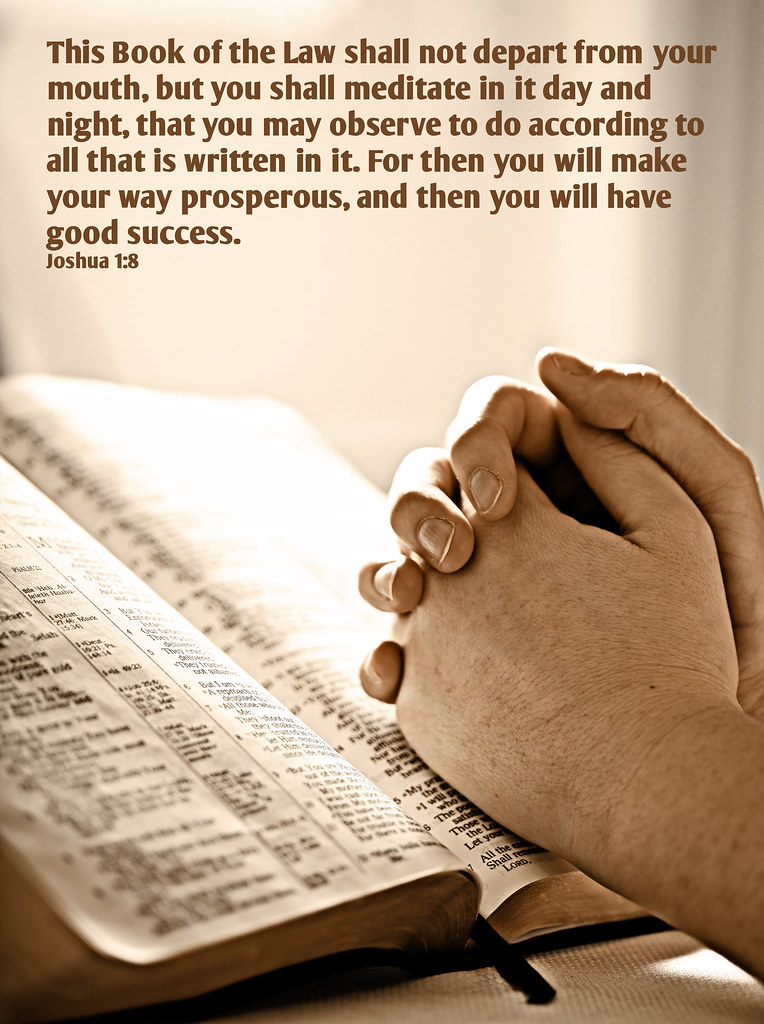
9. What hymn from our hymnbook best summarizes the principle we could glean from the Lord’s instructions to the tribes of Reuben, Gad, and the half tribe of Manasseh in Joshua 1:12-15?
10. What specifically do you suppose the Lord expected the Israelites to do when He told them in 3:5 to “sanctify” themselves? What specific application could you suggest for this principle in our own lives?
11. What would be the equivalent for us of the twelve stones the Lord told Joshua to have the people pile up near where the waters of the Jordan were parted?
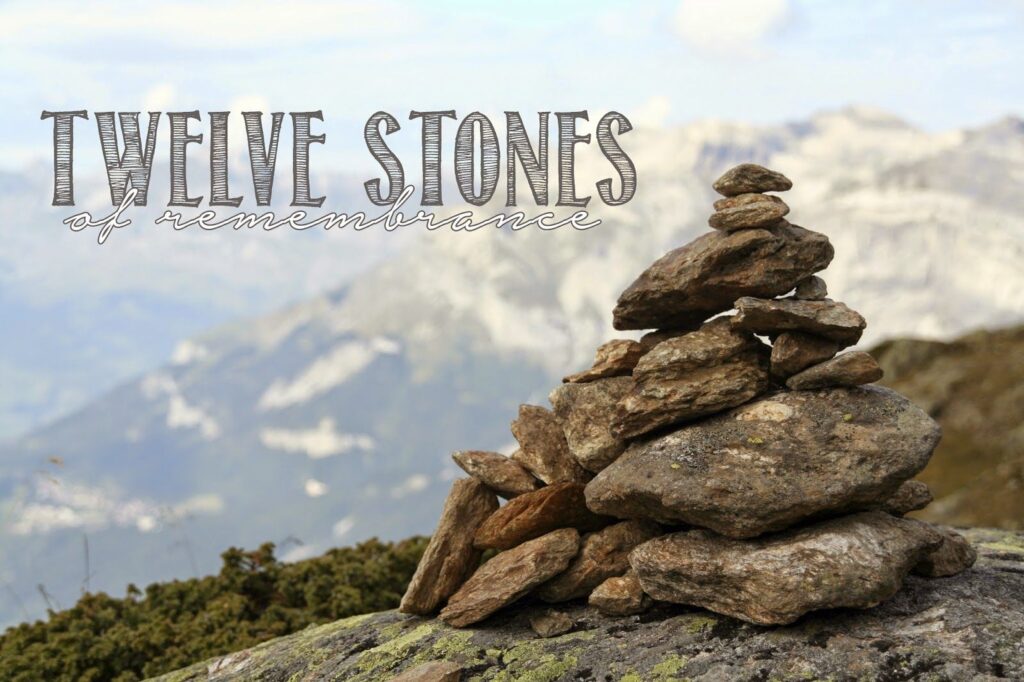
12. What do you suppose was the significance of the visit from the “captain of the host of the Lord” in Joshua 5:13-15?

13. What possible justification do you see for executing not only Achan but his entire family for Achan’s having taken forbidden spoils from the city of Jericho?
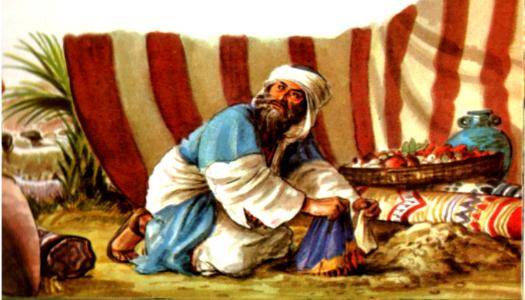
Possible Answers to Points to Ponder in Joshua 1-8, 23-24
1. How was Joshua’s relationship to Moses much like Brigham Young’s relationship to Joseph Smith?
- Both succeeded an even more illustrious predecessor.
- Both were confirmed as the Lord’s designated successor through miraculous means.
- Both led their people into a “promised land” which their predecessors had foretold but never entered themselves.
2. What passage in Joshua would you guess was once recited at the opening exercises of each Latter-day Saint youth activity night?
The last part of Joshua 24:15.
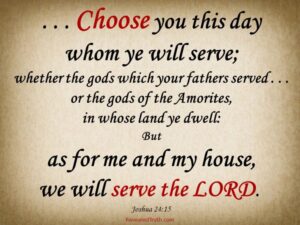
3. Why, of all people, was the prostitute Rahab singled out (with her family) to be spared the fate which befell the rest of Jericho? And how can you defend her lying?
Evidently she was converted to the Israelites’ religion and believed in their God, despite her previous lifestyle. In any case, Jesus taught that harlots would enter the kingdom of God before the Pharisees of His day. Rahab’s lying was to protect the life of the Lord’s servants, not to take unfair advantage of others for her own selfish purposes.
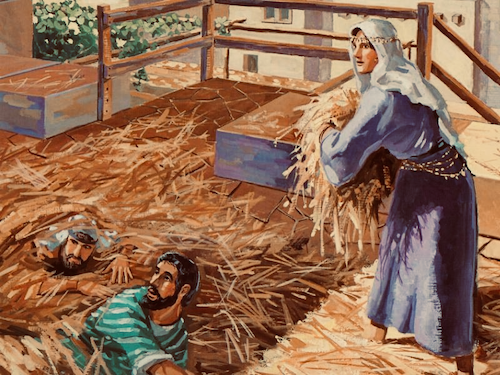
4. Why would the Lord have dammed up the Jordan River for the Israelites at flood stage, in addition to making it easier for the Israelites to get across without drowning? What does He do for us that accomplishes the same thing?
The biggest reason for the miracle was probably not just to get the people across the river ut to convince them that their new leader, Joshua, had the same divine approval that Moses had had, who similarly exercised divine power to divide a body of water. In our day, the Lord generally provides a less visible but even more convincing spiritual witness of the divine calling of His leaders, to those who will seek it.

5. Just when did the Lord stop sending manna to the Israelites? What lessons can we generalize from the answer?
After coming six days a week for 40 years, the manna ceased “on the morrow after they had eaten of the old corn of the land.” The Lord reminds us thereby that He will do for us only what we cannot do for ourselves.
6. What passage in this week’s reading best shows the truthfulness of Ether 12:6, that we receive no witness until after the trial of our faith?
Probably Joshua 3:15-16, which tells us that the waters of the Jordan were not dammed up until the priests bearing the ark actually dipped their feet into the water.

7. What passage in this week’s reading may have been the inspiration for one of the verses in the hymn “How Firm a Foundation”?
Probably Joshua 1:9, which sounds a lot like verse 3: “Fear not, I am with thee, oh, be not dismayed. For I am thy God and will still give thee aid.”

8. What do you consider the two most significant pieces of counsel in Joshua 1:8 concerning what we should do with the scriptures? What can we conclude about the those who read the scriptures constantly but are still poor?
The most significant counsel would seem to be that
- We should not just read them superficially but constantly think deeply about them.
- We should seek to apply every particle of them in our daily lives.
The promised prosperity is not necessarily temporal, so we can’t conclude anything about impoverished scripture readers other than that they are undoubtedly blessed in ways far more significant than financially.
9. What hymn from our hymnbook best summarizes the principle we could glean from the Lord’s instructions to the tribes of Reuben, Gad, and the half tribe of Manasseh in Joshua 1:12-15?
Perhaps #219, which reminds us, “Because I have been given much, I too must give.” These tribes had already reached their own promised lands, but the Lord asked them to help their fellow Israelites who still needed to fight for theirs.

10. What specifically do you suppose the Lord expected the Israelites to do when He told them in 3:5 to “sanctify” themselves? What specific application could you suggest for this principle in our own lives?
He probably expected that at the very least they would pray and repent of any inappropriate activities and attitudes before expecting His assistance in the battles ahead. We might do likewise before any major event in our lives wherein we feel a special need for divine assistance. For example, Nephi tells us in 2 Nephi 32:9 that “ye must not perform any thing unto the Lord save in the first place ye shall pray unto the Father in the name of Christ, that he will consecrate thy performance unto thee, that thy performance may be for the welfare of thy soul.” Fasting could be added, where appropriate, though there is no evidence that the Lord expected Israelite armies to fight on an empty stomach.
11. What would be the equivalent for us of the twelve stones the Lord told Joshua to have the people pile up near where the waters of the Jordan were parted?
The stones were to serve as a visual reminder to the Israelites of the miracle the Lord had done for them. In our day, we can get much of the same benefit from:
- Photos of significant events in our lives.
- Personal histories
- Postings to the Memories section of FamilySearch
- Paintings hung in our homes
- Visitors centers and monuments the Church has erected at places of importance in our history
- Objects in the Church History Museum
- Sacred clothing worn by those who have made temple covenants
12. What do you suppose was the significance of the visit from the “captain of the host of the Lord” in Joshua 5:13-15?
It may have been to comfort and strengthen Joshua prior to his campaign against Jericho and to reassure him that the Lord was ready to fight their battles.
13. What possible justification do you see for executing not only Achan but his entire family for Achan’s having taken forbidden spoils from the city of Jericho?
As harsh as it seems, the following or a combination of them could be possible reasons:
- Achan’s family were co-conspirators with him and could be considered just as guilty.
- Having been subject to the wicked influence of Achan, it was better for his family to be ushered quickly into the spirit world than to be left to ripen in the same iniquity and thus be guilty of sins as grave as those of Achan himself.
- Though possibly innocent themselves, the execution of Achan’s family members served as a powerful warning to other Israelites. If this was the case, the innocent family members would have been ushered into a much happier place, where eternal blessings could still await them.
